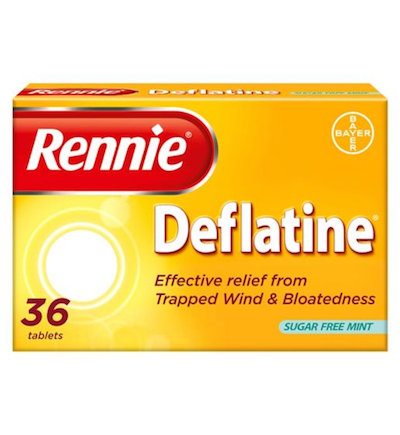What Can You Take for Trapped Wind
From bloating to flatulence: trapped wind certainly is a riot of glamorous symptoms. And, if you are dealing with persistent stomach cramps and abdominal pain, then it makes sense to get clued up on why this gastrointestinal issue happens in the first place – and how to best defeat it.
To guide us on our way, WH has asked Dr Anthony Hobson, a clinical scientist at The Functional Gut Clinic, to share his expertise with us. Think of the below as a knowledge bombs: wind edition.
What is trapped wind?
Trapped wind occurs when the gas that occurs in your digestive tract, as a result of you swallowing air or as a by-product of your gut breaking down foods, builds up. This can cause:
- abdominal pain
- bloating
- flatulence
- gurgling noises coming from your stomach
Why do I keep getting trapped wind?
First off: there are three reasons as to why you might keep getting trapped wind, with myriad causes. Let's break them down.
- You're eating a tad over-enthusiastically and swallowing more air: you'll feel this higher up in your stomach
- You have a food intolerance: you'll feel this in your lower abdomen
- Something more serious is going on
What causes trapped wind?
Trapped wind and eating too fast
'If you eat too fast, you can end up swallowing a lot of gas and air,' says Dr Hobson. 'Then you can start burping a lot.' This is easy to deal with. 'Just try some small behavioural changes,' Dr Hobson elaborates.
What do to do about it:
'Chew your food well before you swallow, and exhale in-between bites.' If you always wait until you're famished before you pick up a fork, it's easy to neglect this, so try not to have your dinner super late.
Trapped wind and artificial sweeteners
Worth noting: some artificial sweeteners, like can be found in chewing gum and diet fizzy drinks, are hard for your stomach to break down, and may also cause trapped wind.
What do to do about it:
Try avoiding these for a while, and see how you go.
Trapped wind and food intolerances
When it comes to the food intolerance potential cause? 'Gas is produced as a byproduct of fermentation in your gut. You have lots of bacteria in your lower gut, which is good, because they help to breakdown some of your food,' explains Dr Hobson.
'But if this gets too aggressive and too much is broken down or if your food is not being absorbed properly [as can be the case when you eat foods that you're intolerant to] you get gas production. You'll usually feel this just below your belly button on the right hand side of your body but it can spread, and is likely to be associated with flatulence.'
What do to do about it:
'Some people, for example, may have a mild intolerance to gluten, rather than a fully-fledged allergy. Some have issues with lactose, in dairy products, or fructose, in fruit drinks.' All of the above can result in an unhappy gut and subsequent trapped wind.
One thing to avoid? 'Be wary of at-home allergy tests,' says Dr Hobson. 'They can be wildly inaccurate.' Seeking out a dietician-approved number, or going via your GP, is a better shout.
Can trapped wind be serious?
The third cause is something you'll need to head to your doctor about. 'If, as well as trapped wind, you're dealing with unintentional weight loss, if you're passing blood when you go to the toilet or if you still have pain after going to the toilet, then go and see your GP,' advises Dr Hobson.
What do to do about it:
They might send you for blood and stool tests, to rule out any serious conditions. Should these come back negative, you may be sent to a dietician, to check about food intolerances.
Trapped wind in early pregnancy
'In pregnancy, everything is more sensitive,' says Dr Hobson. 'This is thanks to the extra abdominal pressure. There are no major changes to your digestion at this time, but everything will be more heightened.' The extra progesterone that your body produces in pregnancy also plays a role: it relaxes the bowel, which can then, again, cause more digestive issues.
What do to do about it:
There isn't much you can do about your progesterone levels, but try and have a good burp after eating, chew thoroughly and slow it right down.
How do you relieve trapped wind?
Short term, taking a little exercise, to get things moving in your gut, may help to release some of the gas. Try taking a walk after you eat or do some gentle yoga stretches. Massaging your abdominal area might help, too.
You could also take some over-the-counter trapped wine medication.

Rennie Deflatine Trapped Wind Relief 18 Tablets
Rennie superdrug.com
£2.49
Why does trapped wind hurt so much?
When excessive gas accrues in your digestive system, the pressure can cause pain.
How long can trapped wind last?
If you're getting trapped wind consistently for three months and you've tried all the usual lifestyle modifications, then Dr Hobson recommends heading to your GP. (If you are passing blood, obviously head there right away.)
What does trapped wind feel like?
When you have trapped wind, you might feel that you are bloated, as well as crampy or stabby stomach pains.
Claudia Canavan As digital Beauty and Health Editor, with an MA in Magazine Journalism, Claudia is a devotee of natural, organic and cruelty-free skincare and of nurturing a banging mind-body connection.
This content is created and maintained by a third party, and imported onto this page to help users provide their email addresses. You may be able to find more information about this and similar content at piano.io
What Can You Take for Trapped Wind
Source: https://www.womenshealthmag.com/uk/health/conditions/a26834479/trapped-wind/
0 Response to "What Can You Take for Trapped Wind"
Post a Comment